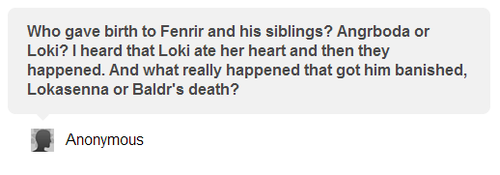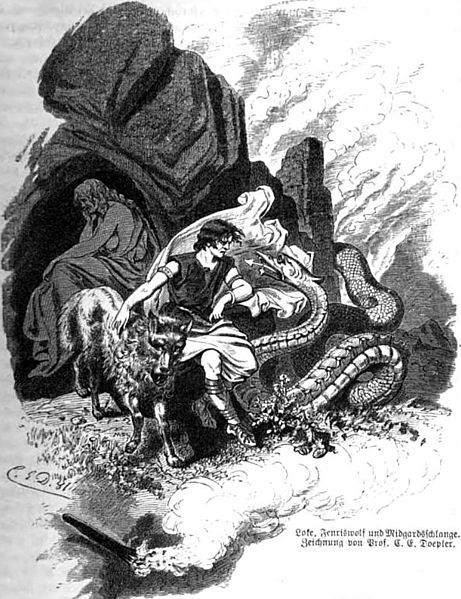#loki laufeiarson
The largest volcano in the solar system, located on Jupiter’s moon Io, is called Loki, named after Loki of Norse Mythology. There are several other volcanoes on the moon of Io, and all of them are named after mythical figures, most of whom are associated with fire.
Loki generates more lava and heat than all volcanoes on Earth combined, is 202km in diameter, and under the crust, is part of a molten core as large as half of the Earth’s moon.

Above, Loki’s eruption is clearly visible from space.
(Information gathered from the Smithsonian National Air and Space Museum’s website, located at: http://airandspace.si.edu/ , originally obtained via NASA’s Galileo Mission: http://solarsystem.nasa.gov/galileo/)

The birth-mother of Fenrir, Hel, and Jormungandr is, for the most part, said to be Angrboda, with Loki as the father. I disagree with this claim, and believe Loki to be the birth-mother. There is support for both the former and latter, but that point is not made clear enough in our surviving sources to make a proper conclusion.
The idea of Angrboda as mother of the brood has merit in its simplicity. Most people assume the female to be the mother, and the male to be the father. Angrboda is female, Loki is male. The mother/father is not explicitly stated, so perhaps the simplest explanation should be assumed.
This claim also tends to go hand-in-hand with the assertion that Angrboda is Loki’s mistress or other wife in Jotunheimr, but this seems completely unfounded to me. There is really no evidence of a relationship having ever existed between the two, or that they even knew one another. I suppose Loki’s self-professed promiscuity could explain him fathering children with a completely arbitrary woman, but casting Angrboda as Loki’s wife seems to be too lazy an assumption.
The incident on which Loki eats a woman’s heart comes from Hyndluljod, a source more dated than Snorri, in the Poetic Edda; as such, I feel the references therein are more accurate to authentic Norse mythology. The account is incredibly vague, and all that is revealed is that Loki eats the half-cooked heart of an “evil woman” that he takes from the embers. He becomes pregnant from this, and gives birth to “the monsters” (flagð). It is not made clear to which “evil woman” the heart belongs, or to what beings “the monsters” refers.
“The monsters” may refer to Fenrir, Jormungandr, and Hel – they are indeed the most suited for the title, among Loki’s other offspring.

These three “monsters” are usually attributed to the union of Angrboda and Loki, so if it is assumed these three are “the monsters”, then it must also be assumed that the heart belonged to Angrboda. One section of Hyndluljod states that Loki gained the wolf (Fenrir) by Angrboda, which may imply that it was Loki impregnated by Angrboda.
The heart that Loki ate is a mystery all on its own, and its origins should be considered before attributing it to Angrboda. It came from an “evil woman”, Loki took it from the embers, and it was half-cooked. The Voluspa, another entry in the Poetic Edda, mentions the Aesir-Vanir war, which came about when an “evil woman” named Gullveig was thrust with spears and burned by the Aesir in Odin’s hall. We are told she was burnt and reborn three times over, and even that was not enough to destroy her. Perhaps a half-cooked heart remained, and this was the one Loki ate? Angrboda’s heart was said to be frozen like the sea spray, so this may be why the heart did not burn when the rest of the body did. Loki’s reason for eating the heart may have been to prevent further resurrection, which is very similar to Loki’s countless outlandish solutions to unsolvable problems facing the Aesir.
There is a great deal of evidence, although still not fully accepted, that Gullveig and Angrboda are one and the same. I’ll go into Angrboda/Gullveig/Heid in detail in a later post – I need to answer your question first and foremost, and if I start talking about Angrboda, I’ll never get around to it. Angrboda is written as Aurboda in Svipdagsmal, which gives the name the exact same meaning as Gullveig. “Aur” and “Gull” both mean gold, and “boda” and “veig” both refer to a strong alcoholic drink. From the above, although there is no concrete proof, there is a clear possibility that Loki was impregnated by eating Angrboda’s heart, and thus gave birth to his famous monstrous brood.
It is simplest to assume the female Angrboda as the mother, and the male Loki as the father, but we also have evidence to the contrary. There is a bit of confusion on this point, and it seems to be intentional. Angrboda is sometimes called the father, and Loki the mother, and then vice versa. Perhaps this is intended to call attention to the fact that the parentage is different from what is expected. Loki’s androgyny is definitely a theme in many of his myths, and Angrboda’s androgyny is also mentioned at one point (An observer cannot decide if Angrboda is a woman, or a man disguised as a woman). This may be further evidence of their mismatched parental roles.
Furthermore, in Helgakvida Hundingsbane I of the Poetic Edda, two characters are insulting one another by comparing one to Loki, and the other to Angrboda. The character comparing himself to Loki says to his Angrboda-like opponent that they produced the wolf together, and that he was the father. The Angrboda companion corrects him, saying that Loki is not the true father, and that he was emasculated by giving birth to the wolf. If Loki became pregnant by eating Angrboda’s heart, then it was Angrboda’s seed that fertilised Loki, making Angrboda the true father.
So there you go. We don’t know for sure whether the father is Loki or Angrboda, but I believe it was Angrboda, and there is indeed a good deal of support for this idea. There is some more evidence, but it requires a lot more explanation, so I might go into it again once I’ve properly explained Angrboda on this blog.
As for Loki’s banishment/getting bound, it was caused by the events of Lokasenna. For the most part, it seems that the gods bound Loki because they were really angry that he had slandered all of them. Granted, some of the slander was pretty bad, but a lot of it, if not all, was true. Loki knew everybody’s dirty little secrets, and when he revealed them all at the Lokasenna, he got into some trouble. I will write a post on Baldr’s death, and another on Lokasenna as soon as I can – sorry it’s taking so long! I’m pretty busy with university right now, and my major is Chemistry, which is about as far from Norse mythology as you can get…
Each day of the seven day week held a special significance to a god. Sunday was the day sacred to the Sun, Monday the Moon, Tuesday Tyr, Wednesday Odin, Thursday Thor, Friday Frigga, and Saturday Loki. The name of each day sounds fairly similar to its corresponding god, with the exception of Saturday, which is often mistakenly assumed to be named for the Roman god Saturn.
Saturday, the final day of the week, was originally known as Laugardag (formed from Loki’s name, but it translates to wash-day). When adapted to English, the day did in fact maintain its connection to Loki. The word Saturday is based on Sataere (the thief in ambush). This is simply another one of Loki’s names, used when referring to Loki as a god of agriculture (each of the gods presided over several different aspects of the universe, and Loki was no exception). So, although few know of it, the final day of the week is still named for Loki.
Incidentally, I’ve seen a lot of campaigns online prompting people to begin calling Saturday “Lokisday”. Most people have no idea Saturday is named after Loki, so Loki’s significance to the day is forgotten. This campaign to call Saturday Lokisday seeks to reinforce Loki’s connection to the day. This is an interesting idea, and I will definitely attempt to use Lokisday as often as I can remember.
